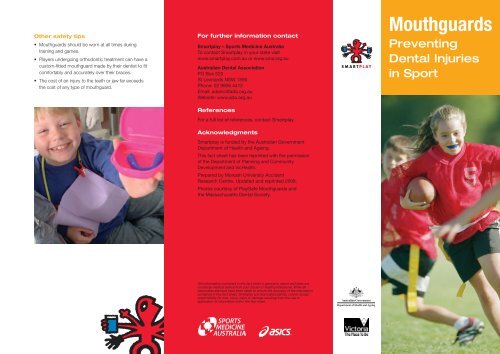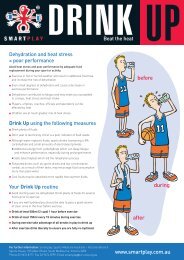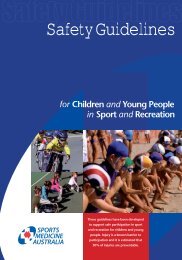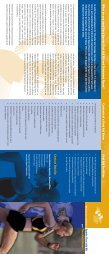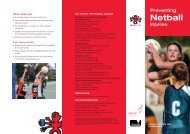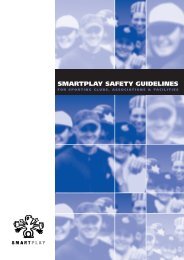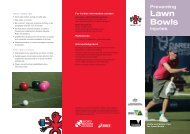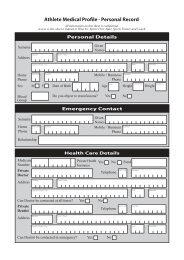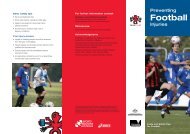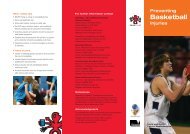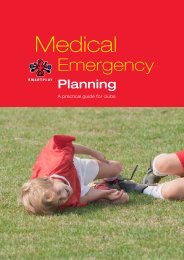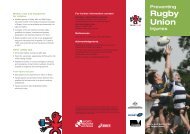Mouthguards - Smartplay
Mouthguards - Smartplay
Mouthguards - Smartplay
You also want an ePaper? Increase the reach of your titles
YUMPU automatically turns print PDFs into web optimized ePapers that Google loves.
Other safety tips<br />
• <strong>Mouthguards</strong> should be worn at all times during<br />
training and games.<br />
• Players undergoing orthodontic treatment can have a<br />
custom-fitted mouthguard made by their dentist to fit<br />
comfortably and accurately over their braces.<br />
• The cost of an injury to the teeth or jaw far exceeds<br />
the cost of any type of mouthguard.<br />
For further information contact<br />
<strong>Smartplay</strong> – Sports Medicine Australia<br />
To contact <strong>Smartplay</strong> in your state visit<br />
www.smartplay.com.au or www.sma.org.au<br />
Australian Dental Association<br />
PO Box 520<br />
St Leonards NSW 1590<br />
Phone: 02 9906 4412<br />
Email: adainc@ada.org.au<br />
Website: www.ada.org.au<br />
References<br />
For a full list of references, contact <strong>Smartplay</strong>.<br />
Acknowledgments<br />
<strong>Smartplay</strong> is funded by the Australian Government<br />
Department of Health and Ageing.<br />
This fact sheet has been reprinted with the permission<br />
of the Department of Planning and Community<br />
Development and VicHealth.<br />
Prepared by Monash University Accident<br />
Research Centre. Updated and reprinted 2008.<br />
Photos courtesy of PlaySafe <strong>Mouthguards</strong> and<br />
the Massachusetts Dental Society.<br />
<strong>Mouthguards</strong><br />
Preventing<br />
Dental Injuries<br />
in Sport<br />
This information contained in this fact sheet is general in nature and does not<br />
constitute medical advice from your doctor or health professional. While all<br />
reasonable attempts have been made to ensure the accuracy of the information<br />
contained in this fact sheet, <strong>Smartplay</strong> and associated parties, cannot accept<br />
responsibility for loss, injury, claim or damage resulting from the use or<br />
application of information within this fact sheet.
Preventing dental<br />
injuries in sport<br />
Dental injuries can be painful, disfiguring, expensive to<br />
treat and often require long-term management. Injuries<br />
can include cuts to the lips, gums, cheeks, tongue<br />
and face; chipped or broken teeth; knocked out teeth;<br />
and in severe cases a broken jaw. Such injuries may<br />
result in the need to take time off work or school to<br />
recover, lengthy treatment and long-term physical and<br />
monetary costs.<br />
How many injuries?<br />
• Injury surveillance data shows that at least 2,000 dental<br />
injuries were treated in Victorian hospital emergency<br />
departments between 2002 and 2004.<br />
• Dental injuries predominantly occur in people aged<br />
under 25 years of age (71%).<br />
When do dental injuries occur?<br />
• Approximately 44% of these injuries occurred during<br />
active recreation/leisure activities such as cycling,<br />
skateboarding and riding a scooter.<br />
• Between 5% and 14% were sustained during organised<br />
sports, including football, basketball, netball, cricket,<br />
hockey and soccer.<br />
• People with protrusive front teeth, inadequate lip<br />
coverage over their teeth or who have orthodontic<br />
treatment are often at greater risk of dental injury.<br />
The importance of wearing<br />
a mouthguard<br />
Wearing an appropriately designed and made<br />
mouthguard while participating in sport will protect<br />
against dental injuries.<br />
Players of all ages involved in sports and activities where<br />
they are at risk of an injury to the face should protect<br />
their teeth with a properly fitted mouthguard.<br />
This includes sports where there is a risk of collision,<br />
falling and/or contact from other players or equipment<br />
such as balls, bats, sticks or racquets.<br />
Important features of a<br />
protective mouthguard<br />
• Comfortable but tight fit within mouth.<br />
• Allows normal breathing and swallowing.<br />
• Allows normal speech.<br />
• Correct thickness (4mm) over the teeth to provide<br />
protection against impact.<br />
• Does not cause gagging.<br />
• Odourless and tasteless.<br />
Three types of mouthguards<br />
available<br />
1. Custom-fitted mouthguards are considered to<br />
provide the best protection of the teeth, lips and jaw.<br />
Custom-fitted mouthguards are made by a dentist<br />
or a dental technician to fit the individual's mouth,<br />
and provide the best protection due to their close fit,<br />
comfort and cushioning (shock absorption) effect.<br />
2. Boil and bite mouthguards are directly formed to the<br />
upper teeth after the lining is softened in boiling water.<br />
They can be uncomfortable if not properly fitted, and<br />
provide limited protection. They should be replaced<br />
each season.<br />
3. Stock (ready-to-wear) mouthguards come pre-formed<br />
and are the least expensive type of mouthguard,<br />
but also provide the least amount of protection, fit<br />
and comfort.<br />
Caring for your mouthguard<br />
• Rinse in soap and warm (not hot) water or<br />
mouthwash after each use and allow it to air-dry.<br />
• Keep mouthguard in a well-ventilated plastic storage<br />
box when not in use (box should have several<br />
holes in it).<br />
• Do not leave your mouthguard in direct sunlight, in<br />
a closed car or in the car's glovebox.<br />
• Ensure your mouthguard is in good condition before<br />
each use.<br />
• Get your dentist to check your mouthguard when you<br />
go for your check-up. Replace it if it is damaged.


